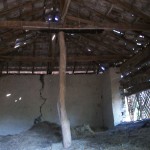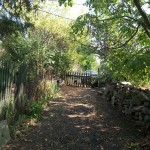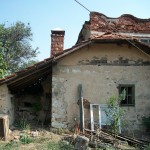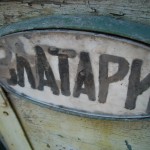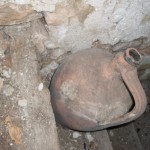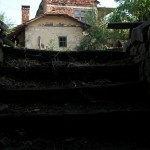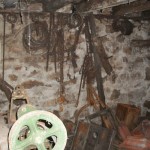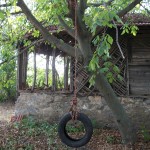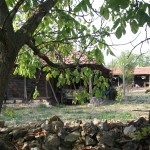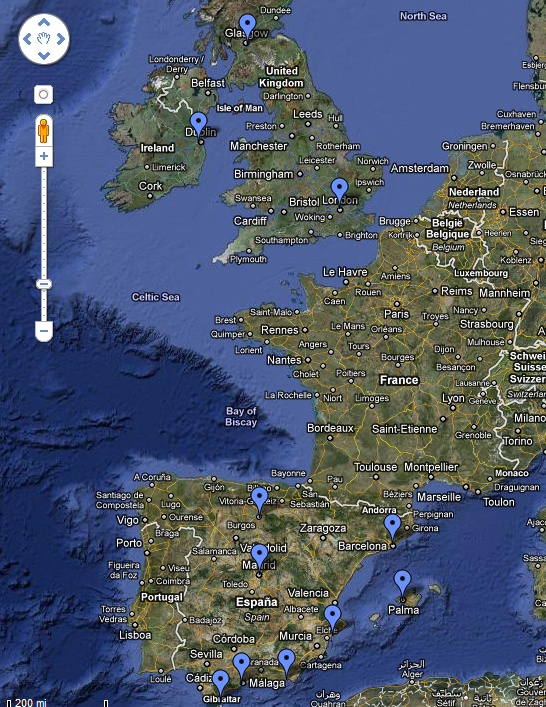Bulgarian Cookbook with Authentic Bulgarian Recipes Just Published
 For many years, friends and partners have been asking us about Bulgarian cuisine. What does it include? Does it taste good? What are our favorites and so on? It has been our experience that Bulgarian cuisine is very attractive to the Northern American tastes. Actually, we do not have a single friend or partner who have visited us and worked with us in Bulgaria who did not fall in love with our food.
For many years, friends and partners have been asking us about Bulgarian cuisine. What does it include? Does it taste good? What are our favorites and so on? It has been our experience that Bulgarian cuisine is very attractive to the Northern American tastes. Actually, we do not have a single friend or partner who have visited us and worked with us in Bulgaria who did not fall in love with our food.
After many requests, Kathryn has taken a personal interest in collecting our favorite Bulgarian recipes and putting them in this small cookbook. Now, these are much different than the modern Bulgarian diet that today includes fast food restaurants and junk food snacks. The book has 25 personally customized recipes of authentic Bulgarian cuisine. Not only that they carry the typical Bulgarian flavor, but each recipe comes with a personal story. You will enjoy cooking them with your family and friends most of all, you will enjoy serving and sharing them with everyone.
Bulgarian Village Motifs
Bulgarian Churches in Western Europe
Bulgarian Churches in Spain
View UntitledBulgarian Churches in Spain in a larger map
Bulgarian Churches in the United Kingdom
View Bulgarian Churches in the United Kingdom in a larger map
Bulgarian Churches in Cyprus
View Bulgarian Churches in Cyprus in a larger map
Bulgarian Church of God in Cyprus
For the past three years the community of Bulgarian immigrants on the island of Cyprus has been swept by a Holy Ghost revival much similar to the revival which brought freedom in Bulgaria some 20 years ago after the fall of the Berlin Wall. Similar phenomenon was observed in the mid 90s in the Chicago Metro area, where several Bulgarian churches spurred up into a revival and as surveys showed years later, this has become the main characteristic of the establishment of Bulgarian immigrant churches across the world.
But the similarities with the Chicagoland revival of the 90s do not stop here. Just like in Chicago, some 65,000 Bulgarians live and work on the island of Cyprus. And this is the number of only the registered ones. But while the Bulgarians in Chicagoland are spread across only 220 sq.m. of the city, the island area of Cyprus has 3,500 sq.m., which makes their networking and communication much harder.
Pentecostal ministry among the Bulgarian Diaspora began somewhere around 2005 with small groups that reached 30-40 people. In this context of ministry, in the spring of 2008, the first Bulgarian Church of God congregation was formed in the city of Nicosia (Levkusia) with Bulgarian trained Church of God minister Rumen Metodiev as the pastor, under the supervision of Bishop Michael Charalambous, overseer of the Cyprus Church of God of Prophecy.
After a series of deliverance revival meetings, the growth of the congregation exploded and within a few months reached some 200 people. When special services are held once or twice a month over 300 people show up, making it impossible for the congregation to meet in their current location. Bulgarians from other parts of the island reached out to the new church and soon a new Bulgarian congregation was started in Limassol, a Mediterranean resort an hour way from the capital Nicosia. And then another Bulgarian Church of God was started only a few months ago in the city of Paphos and already numbers some 55 parishioners.
As the network of Bulgarian churches in Cyprus is growing, congregations are facing important decisions that demand immediate answers in the areas of leadership training, finances and cultural contextualization. After successfully recovering from some initial dilemmas through the establishment of a strong leadership team, the congregation in Limassol is already looking for a new larger building to rent in order to accommodate their growing attendance. The congregation in Nicosia is at a point where they need to acquire their own building for their meetings, but with their rapid growth, such may be difficult to find on the small island.
Our purpose in visiting with the Bulgarian churches in Cyprus was to hold a two week revival and to train leadership teams to assist the local pastors. We had a total of 14 services with the Bulgarian congregations and one with the Greek Church of God of Prophecy congregation in Nicosia. Our team held over 20 training sessions covering the areas of Bible study, the ministry of preaching, types of ministry, team building and church leadership. Pastor Iliya Panov joined us during the second week of training and covered the topic of praise and worship as well as provided a powerful presence of worship during our time together.
During the course of the revival, a Bulgarian pastor from Paralimni attended the meetings. Upon their invitation, we held an evangelization meeting on Saturday night, which brought many new souls to Christ and strengthened the faith of this new congregation.
Now, after having our annual “X” youth events in Bulgaria for four years in Sofia (2006), Bourgas (2007), Uzana in the Balkan Mountains near Gabrovo (8.8.2008) and the city of Samokov (9.9.2009) we are anticipating this new level of global ministry on 10.10.2010 in Cyprus, when “X” will be held for the first time outside of Bulgaria. The event will be hosted in partnership at the Cyprus Church of Prophecy in cooperation with all Bulgarian congregations on the island.
90 Years of Bulgarian Pentecostalism
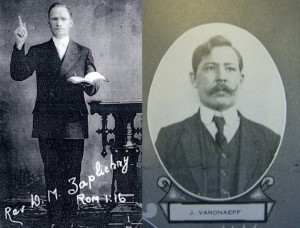 Bulgarian Pentecostal believers celebrate 90 years of ministry and history. The Bulgarian Pentecostal movement is rooted in the Azusa street holiness Pentecostal revival which began in April of 1906. The revival then spread through the United States and less than a decade later, large Pentecostal denominations as the Church of God and the Assemblies of God were formed embracing the vision to send missionaries to foreign lands.
Bulgarian Pentecostal believers celebrate 90 years of ministry and history. The Bulgarian Pentecostal movement is rooted in the Azusa street holiness Pentecostal revival which began in April of 1906. The revival then spread through the United States and less than a decade later, large Pentecostal denominations as the Church of God and the Assemblies of God were formed embracing the vision to send missionaries to foreign lands.
After establishing contact with the World Missions Department of the Assemblies of God at the end of 1919, Cossack born immigrant, who later took on Ukrainian citizenship, Ivan Voronaev received a calling to return to his motherland and preach the message of Pentecost there. Alongside him traveled the family of Ukrainian immigrant Dionissey Zaplishny and his Bulgarian born wife Olga, who like Voronaev left the church they pastored in the United States to obey the call to missions.
On March 10, 1920, Assemblies of God issued Voronaev a certificate as a “pastor and evangelist in Bulgaria” valid till September 1, 1921 and on June 22, 1920 Voronaev notified them his plans to set sail for Russia with his family on July 13, 1920. On the said date, the Voronaev, Koltovitch and Zaplishny’s families set sail on the “Madonna” steamboat from New York to Constantinople. Along with them traveled a group of Kavkaz believers among which was Bulgarian Boris Klibok.
After arriving to Constantinople, they had to wait for visas to enter Russia. Voronaev immediately began meeting with the Russian community in town recognizing the lack of Russian Bibles and Pentecostal churches. He wrote on August 15, 1920: „ ….with the help of God opened Russian mission here [Constantinople], and God our work blessed;” and on August 30, 1920: „…. we had first baptism with water in river. I baptized one lady wife of a Russian office. Glory to Jesus!”
After waiting for three months in Constantinople, Voronaev arrived in the Bulgarian port city of Bourgas along with Bulgarian Boris Klibok. The Zaplishny family had already established their ministry there through Olga’s Congregational home church. What followed next was a revival that made history.
March 5, 1921: The Pentecostal Evangel published Voronaev’s report from Bulgaria where he has been holding Russian-Bulgarian revival services in various churches in the cities of Sliven, Yambol, Varna and Sofia. Seven received the baptism with the Holy Spirit.
April 16, 1921: The Pentecostal Evangel published Voronaev’s second report from Bulgaria about services in Sliven, Bourgas, Plovdiv and the Baptist Church in Stara Zagora where the daughter of the Baptist pastor from Kazanlak received the baptism with the Holy Spirit.
May 14, 1921: Services in the Congregational Church in Plovdiv and baptismal service in the Martiza River.
June 11, 1921: „In Bourgas, Bulgaria the Lord baptized with the Holy Spirit about fourteen souls. We have about twenty candidates for baptism with water, and about thousand Bulgarians and Russian were there and were much interested.”
July, 1921: The Latter Rain Evangel published an article under the title “Pentecost in Bulgaria” in which Voronaev wrote about new Pentecostal believers in seven Bulgarian cities, his relocation in Varna to work with the local Methodist church and his plan to move to Odessa. The Pentecostal Evangel from the same month wrote, “God called Brother J.W. Voronaeff, who had charge of a Russian Pentecostal Assembly in New York City, to Russia.”
The early Bulgarian Pentecostals spoke in other tongues, embraced the gifts of the Spirit, practiced foot washing and conservative holiness, and received the Bible as their rule of life almost to the point of ritualistic ascetism. It was their prayer, preaching and serving before the Lord that ensured the future of the movement. Many of them would be forced underground when the Pentecostal Union is registered with the Bulgarian State in 1928. Others will be persecuted even unto death during the Communist Regime after WWII. The more conservative group split right down the middle by two strong leaders, Tinchevists and Borisovtsi would protect the faith to the best of their abilities. Many modern religious formations, among which the Bulgarian Church of God, would spring out from these grassroots of these holiness seeking Pentecostal Puritans. By 1990, after the Berlin Wall had fallen, this group of people will go through the largest evangelistic revival in Bulgaria since the Christianization of Bulgaria in 861AD.
Reclaiming the Roots of the Bulgarian Church of God
 The Bulgarian Church of God started in the 1920s north of the Balkan Mountains as part of the Bulgarian Pentecostal movement. They came to be known as the “northern brethren” and “free churches.” They had received the message of Pentecost under the ministry of first Assemblies of God missionaries to Eastern Europe Zaplishny and Voronaev and kept their faith fervently through the early years of persecutions. The first Church of God members were Holy Ghost baptized, Bible believing believers who walked in the Spirit of prophecy and practiced the supernatural gifts God had given them.
The Bulgarian Church of God started in the 1920s north of the Balkan Mountains as part of the Bulgarian Pentecostal movement. They came to be known as the “northern brethren” and “free churches.” They had received the message of Pentecost under the ministry of first Assemblies of God missionaries to Eastern Europe Zaplishny and Voronaev and kept their faith fervently through the early years of persecutions. The first Church of God members were Holy Ghost baptized, Bible believing believers who walked in the Spirit of prophecy and practiced the supernatural gifts God had given them.
Their theology was conservative and their practices strict. But their prayers could be heard all through the night as they tarried in fervent persistence, testing themselves against the Word in a constant search for the holiness of God in their hearts. And humbled themselves when they had found it, they experienced miracles ever unseen, knew things of matters untold, saw visions no man was allowed to utter and heard from the throne room in glory, from God, receiving the words to be spoken to their generation. Their tears became rivers of life that watered the seed of the Gospel they sowed, and slowly but surely God blessed their work and brought back revival in the soul of the land.
When the Assemblies of God trained and sent Bulgarian born Dr. Nick Nikoloff in 1928 to bring to order the growing Bulgarian Pentecostals, the Church of God people set themselves apart refusing to register with the secular state, thus loosing their legal status and were forced to go underground. But their prayers were still heard in the darkness of persecution. The stories of the gifts they practiced were told and when only a miracle could have answered a need, it was brought to the people who practiced the gifts, who prayed without ceasing and waited on God till He gave the answer from Heaven above.
Some 90 years have passed since these humble beginnings and times have now changed. Now, new things, new people, new orders and such are taking new rule of soul and of life. And slowly but surely the story is forgotten. The glory of old is long gone in the past.
But it is said that in crises, when times are too hard, someone should return to the basics of life, to reclaim the old roots of the faith from the past, and save again people and free them at last. This time is right now … and this chance must not pass.
Some of the Projects Completed with the Bulgarian Church of God in 2005-10
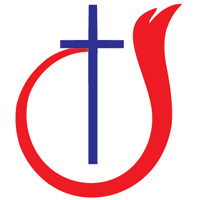 1. Chaplaincy: Bulgarian Chaplaincy Association and masters program in chaplaincy
1. Chaplaincy: Bulgarian Chaplaincy Association and masters program in chaplaincy
2. Ethnic Minorities: annual Roma events and training seminars
3. Evangelism: 19 documented revivals, 24 evangelization meetings and 9 prayer rallies
4. Leadership Seminars for Church of God regional representatives
5. Media: COGBG.com and related websites
6. Mobile Bible School for pastoral teams and local churches
7. National Assembly for the Bulgarian Church of God
8. Served on the educational committees, evangelism board and church planting teams
9. Sunday School Program (2001-2002 and 2010 anniversary addition)
10. Youth Ministry: annual national events and camps


